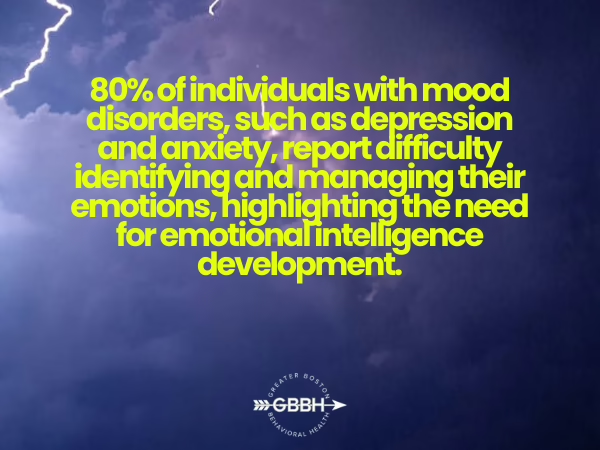Recovery is not just about overcoming physical or psychological challenges; it is also about developing the skills to navigate complex emotions and build healthy relationships. Emotional intelligence (EI) is a crucial component of this process. Defined as the ability to recognize, understand, and manage your emotions while empathizing with others, emotional intelligence is key to achieving long-term success in recovery. For individuals dealing with anxiety, depression, or emotional dysregulation, enhancing EI can provide the foundation for lasting wellness.
At Greater Boston Behavioral Health, we integrate emotional intelligence-building strategies into our Mental Health Treatment Programs. Through evidence-based therapies like DBT Therapy and CBT Therapy, our programs help clients develop the emotional awareness and resilience needed for sustainable recovery. This blog explores the concept of emotional intelligence, its role in recovery, and how our therapeutic approaches can support growth in this critical area.
What Is Emotional Intelligence?
Emotional intelligence refers to the ability to:
- Identify Emotions: Recognize your own emotions and understand how they affect your behavior and decision-making.
- Regulate Emotions: Manage and respond to emotions in constructive ways, even during stressful or challenging situations.
- Empathize with Others: Understand and consider the emotions of others, fostering healthier relationships.
- Communicate Effectively: Express emotions clearly and assertively without escalating conflict.
Components of Emotional Intelligence (EI):
- Self-Awareness: Understanding your emotions and how they influence your actions.
- Self-Regulation: Managing impulsive reactions and maintaining emotional balance.
- Motivation: Using intrinsic goals to guide behavior and maintain focus during recovery.
- Empathy: Recognizing and respecting the emotions of others.
- Social Skills: Building and maintaining positive relationships.
Why Emotional Intelligence Matters in Recovery
Developing emotional intelligence is especially important in recovery, as it equips individuals with the tools needed to navigate the emotional complexities that arise during this transformative process.
1. Managing Triggers and Emotions
Recovery often involves confronting past trauma, unresolved emotions, and challenging situations. Emotional intelligence helps individuals identify and process these feelings without becoming overwhelmed.
- Example:
A client in our Depression Treatment Program learns to recognize signs of sadness or frustration early and uses DBT-based emotional regulation techniques to prevent these emotions from escalating.
2. Reducing Relapse Risk
Unregulated emotions like anger, guilt, or stress can act as triggers for relapse. By improving emotional intelligence, individuals gain the tools to cope with these feelings in healthier ways.
- Example:
Someone in addiction recovery may use self-regulation skills to manage cravings triggered by emotional distress, reducing the likelihood of relapse.
3. Strengthening Relationships
Healthy relationships are vital for a strong support system during recovery. Emotional intelligence fosters empathy, communication, and conflict resolution, which are essential for building trust and connection with loved ones.
- Example:
In Family Therapy Programs, clients learn how to empathize with the emotions of family members while expressing their own needs effectively.
4. Building Resilience
Recovery is a long-term process that requires persistence and adaptability. Emotional intelligence helps individuals stay motivated and resilient, even when faced with setbacks.
How Emotional Intelligence Supports Behavioral Health in Boston
In the fast-paced environment of Boston behavioral health, emotional intelligence is especially critical for managing the demands of daily life, relationships, and recovery. Many individuals seek treatment for anxiety, depression, or emotional dysregulation, which can all benefit from emotional intelligence development.
Common Challenges Addressed by EI in Behavioral Health:
- Emotional volatility in relationships.
- Difficulty identifying or expressing feelings.
- Impulsive reactions to stress or conflict.
- Persistent feelings of guilt, shame, or inadequacy.
At Greater Boston Behavioral Health, we incorporate emotional intelligence-building techniques into all aspects of our Mental Health Therapy Programs, providing individuals with the tools they need to thrive.
Therapeutic Approaches for Building Emotional Intelligence
1. Dialectical Behavior Therapy (DBT)
DBT Therapy focuses on emotional regulation, mindfulness, and interpersonal effectiveness, making it a powerful tool for enhancing emotional intelligence.
DBT Skills for Emotional Intelligence:
- Mindfulness: Increases self-awareness by teaching clients to observe their emotions without judgment.
- Distress Tolerance: Equips individuals to handle difficult emotions constructively.
- Interpersonal Effectiveness: Improves communication and relationship-building skills.
Example in Practice:
A client struggling with emotional outbursts might use DBT techniques like mindfulness to pause, reflect, and respond thoughtfully during a heated conversation.
2. Cognitive Behavioral Therapy (CBT)
CBT Therapy helps individuals identify and reframe negative thought patterns that interfere with emotional intelligence. By addressing distorted thinking, CBT fosters greater emotional awareness and self-regulation.
CBT Techniques for EI:
- Recognizing triggers for negative emotions.
- Replacing unhelpful thoughts with balanced, constructive ones.
- Practicing assertive communication to express emotions clearly.
Example in Practice:
A participant in our Anxiety Treatment Program might work with their therapist to challenge fears of rejection, enabling them to engage more openly in relationships.
3. Group Therapy for Social Skills
Group therapy provides a collaborative environment for practicing empathy, active listening, and conflict resolution—key components of emotional intelligence.
Benefits of Group Therapy:
- Learning from peers’ experiences and perspectives.
- Practicing interpersonal skills in a supportive setting.
- Building confidence in navigating social interactions.
Example in Practice:
In a Group Therapy Program, clients role-play difficult conversations to build confidence in expressing their emotions assertively.
Practical Tips for Enhancing Emotional Intelligence in Recovery
In addition to professional therapy, there are steps individuals can take to develop emotional intelligence during recovery:
1. Practice Mindfulness Daily
Mindfulness helps you stay present and aware of your emotions, reducing impulsive reactions. Techniques like deep breathing, meditation, or journaling can improve self-awareness.
2. Reflect on Your Emotions
Take time to identify what you’re feeling and why. Journaling can help you process emotions and recognize patterns.
3. Build Empathy
Focus on understanding others’ perspectives by actively listening and asking open-ended questions.
4. Set Boundaries
Learn to assert your needs respectfully without compromising your values or well-being.
5. Seek Feedback
Ask trusted friends or family for honest feedback about your communication and emotional responses.
Why Choose Greater Boston Behavioral Health for Emotional Intelligence Development?
At Greater Boston Behavioral Health, we are dedicated to helping individuals achieve lasting recovery through emotional intelligence and evidence-based care. As a trusted Mental Health Treatment Center in Boston, we offer a range of therapeutic services designed to address the full spectrum of behavioral health needs.
What Sets Us Apart:
- Experienced Clinicians: Our therapists specialize in DBT, CBT, and other proven approaches to enhance emotional intelligence.
- Holistic Care: We integrate individual, group, and family therapy to address emotional, relational, and psychological challenges.
- Supportive Environment: We provide a safe space for clients to learn, grow, and thrive in recovery.
Conclusion
Emotional intelligence is a powerful tool for navigating recovery and building a healthier, more balanced life. At Greater Boston Behavioral Health, we’re here to guide you every step of the way.
Contact us today at (888)278-0716 to learn more about our Mental Health Therapy Programs, DBT Therapy, and other services. Together, we’ll help you cultivate the emotional intelligence needed for lasting recovery and fulfillment.
FAQ on Emotional Intelligence and Its Role in Recovery
What is emotional intelligence?
Emotional intelligence is the ability to recognize, understand, and manage your own emotions while empathizing with others to build healthier relationships.
Why is emotional intelligence important in recovery?
Emotional intelligence helps individuals manage triggers, cope with challenging emotions, strengthen relationships, and reduce the risk of relapse, making it a vital skill for long-term recovery.
How does DBT therapy enhance emotional intelligence?
Dialectical Behavior Therapy (DBT) teaches mindfulness, emotional regulation, and interpersonal effectiveness, which are essential components of emotional intelligence.
Can emotional intelligence improve relationships?
Yes, emotional intelligence fosters empathy, active listening, and effective communication, which strengthen personal and professional relationships.
Does Greater Boston Behavioral Health offer programs to build emotional intelligence?
Yes, we integrate emotional intelligence-building techniques into our Mental Health Treatment Programs, including DBT Therapy, CBT Therapy, and Group Therapy Programs.


